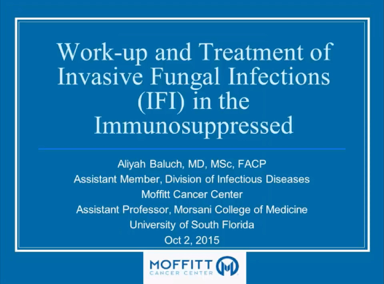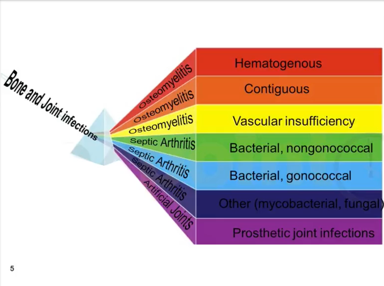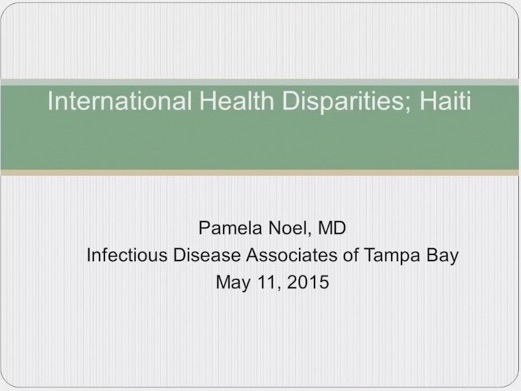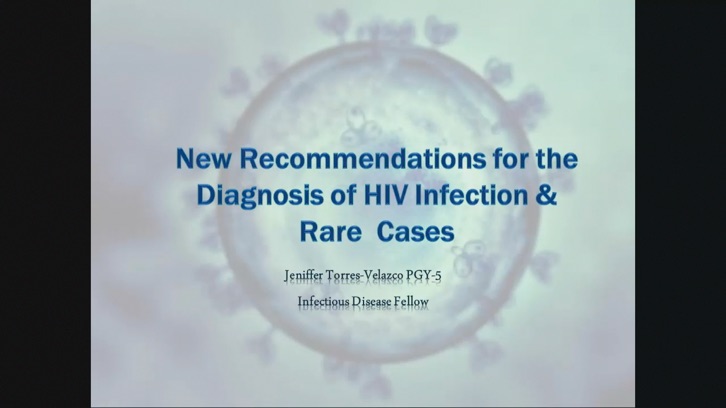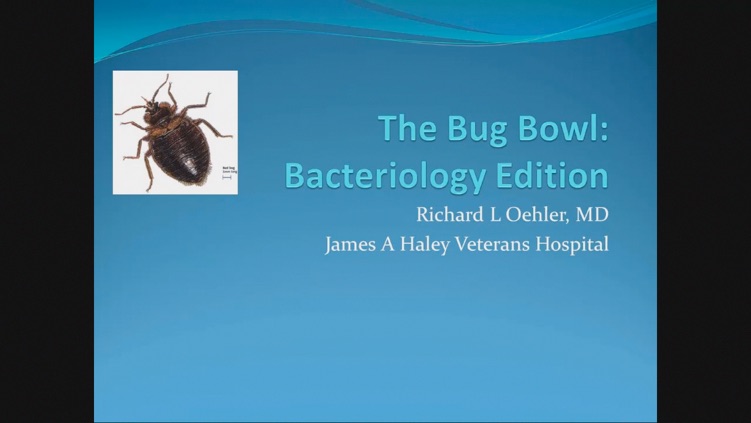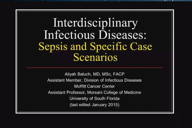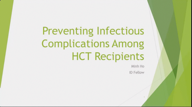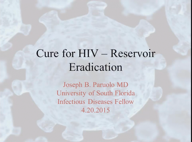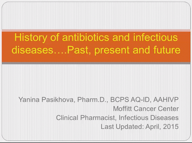Dr. Aliyah Baluch focuses on the work-up and treatment of invasive fungal infections in the immunosuppressed patients. Fungal infections have high morbidity and mortality, but can be hard to clinically diagnose. Invasive infections occur in ICU, Diabetes Mellitus, and immunocompromised patients. Dr. Baluch covers both aspects of Candida and non-Candida species infections, including risk factors, symptoms, prognosis, work-up, and treatment in patients with immunosuppressed patients. She includes a review of fungal structure and the mechanism of action of the drug classes used to treat them – Echinocandins, Polyenes, and Triazoles. She covers timelines that indicate which species to expect during each stage of immunosuppression and with different mechanisms of immunosuppression, including differences between stem cell and solid organ transplants. Biomarkers for treatment and international patterns of drug resistance are also discussed.
Archives
Overview of Bone and Joint Infections
Yanina Pasikhova, clinical pharmacist at Moffitt Cancer Center, presents this talk about bone and joint infections – osteomyelitis, septic arthritis, prosthetic joint infection. Ms. Pasikhova goes over case studies while focusing on different organisms expected in acute vs. chronic infections, route of infections, indications for empiric treatment, and work-up for infections. Infections can occur via hematogenous spread due to risk factors like IV Drug Use, hemodialysis, or immunocompromise, or contiguous from surgery, open fractures, burns, and soft tissue infections. She discusses diagnostics, including best practices for cultures, and indications for imaging studies. Finally, she discusses treatment – while there are no official guidelines for Osteomyelitis, but historically IV antibiotics are used. She reviews the literature which compares oral and IV antibiotics and which antibiotics should be used for different infections.
International Health Care Disparities
Dr. Pamela Noel speaks about infectious disease healthcare in Haiti, including HIV, Tuberculosis, and the effects of the recent earthquake and cholera outbreak in the setting of poverty. She touches on the structure of the country’s education and healthcare systems and economy – Haiti is the poorest nation in the Americas, with 80% of the population living under the poverty line, while 80% of the country’s college graduates leave the country. The healthcare system is mostly located in the capital city of Port-au-Prince, with most of the population having very limited access to care. Dr. Noel talks about the epidemiology behind, causes of premature deaths, HIV and TB in Haiti, as well as current and future efforts to control the infections. She goes on to speak about the damage to the infrastructure due to the 2010 Haiti Earthquake, aid efforts, and continuing aftereffects, especially the increase in MDR TB and the cholera outbreak.
New Recommendations for the Diagnosis of HIV Infection
Dr. Jennifer Tores-Velazzo does a case study about an HIV-infected patient from Brazil and reviews recommendations for the diagnosis of HIV. She touches on the differences between HIV-1 and HIV-2 viruses and their groups and subtypes – HIV-2 does not respond to NNRTI treatment. She explains the traditional direct ELISA test (Western Blot) and the 3rd and 4th generation testing done with the Sandwich ELISA method, and touches on nucleic acid amplification and immunofluorescence assays as confirmatory tests. She discusses the timeline for detection of different parameters – HIV RNA, HIV-1 p24 Antigen, and HIV Antibodies, as well, as window periods where test parameters are undetectable. She goes over the updated FDA recommended algorithm for the use of 4th generation testing for HIV infections, and their pitfalls, ending with recommendations on which tests to order to screen for HIV.
The Bug Bowl: Bacteriology Edition
Dr. Richard Oehler reviews Bacteriology from Bailey and Scott’s Diagnostic Microbiology, 12th Edition, in a series of game-show styled questions. Play along with Dr. Oehler and colleagues and test your knowledge on prokaryotic pathogens, while learning some new Infectious Disease trivia along the way.
Chikungunya and the Tropical Americas
Dr. Lysenia Mojica reviews mosquito-borne chikungunya in the Americas. Main symptoms include fever greater than 39C, severe bilateral polyarthralgias, and maculopapular rash, among several others. She also reviews atypical presentations, clinical course, sequellae (persistent arthralgias), diagnostics, differential diagnosis, work-up, and treatment. She also touches on the importance of ruling out dengue fever in the workup and treatment of chikungunya. Finally, she touches on prevention techniques to contain the spread of the virus and discusses recent cases of chikungunya in the Americas.Guest
Sepsis and Case scenarios
Dr. Aliyah Baluch reviews the Surviving Sepsis Campaign, current updates on sepsis, and some cases of sepsis. Dr. Baluch goes over SIRS, sepsis, and shock criteria, epidemiology, etiology/pathophysiology, diagnosis, work-up, and both empiric and definitive treatments. She touches on toxin etiologies, risk factors for severe sepsis, including immunosuppression. Sepsis can present in various ways – ARDS, Sick Euthyroid, Delirium, Ileus, and DIC, among other systemic disorders and Dr. Baluch discusses the importance of treating the potentially fatal condition. She addresses goals of therapy by the Surviving Sepsis Campaign and the effects of the campaign.
Preventing Infectious Complications Among Hematopoietic Stem Cell TransPlant Patients
Dr. Mihn Ho speaks about the prevention of infection in recipients of hematopoietic stem cell transplants. He reviews the process of transplantation, sources of infection, different phases of opportunistic infections, and the indications for prophylaxis post-transplantation. He touches on the history of BMT, starting with the 1940s to modern outcomes. He then addresses infectious disease concerns regarding these patients: pre-transplant infection screening, opportunistic infections, and infection prevention.
Finding a Cure for HIV: Reservoir Eradication
Dr. Joseph Paruolo discusses the HIV reservoir, patients thought to be cured, and continuing efforts to cure HIV. Reservoirs include immunological cells, the brain, retinal cells, myocytes, adipose, kidneys, GI tract, epithelium, testes – which can be difficult for ART to penetrate. He discusses measuring the reservoir and viral load in an effort to detect cure rate. To date, only one person, Timothy Brown, has been confirmed to be cured, while several others thought to be cured but who had very low viral loads due to viral reservoirs.
The History of Antibiotics: Past, Present and Future
Yanina Pasikhova, PharmD, discusses the history of antimicrobial drugs and the future implications in the setting of increased antimicrobial resistance. Infectious diseases were the leading cause of death in the pre-antibiotic era – including pneumonia, TB, enteritis, and wound infections. She discusses the advent of penicillin and sulfa-antibiotics, among 14 unique classes of antibiotics during the golden age of antimicrobials. She also discusses the development of resistance early in the golden age, and increased resistance today. She tracks the etiology of resistance including antibiotic overuse and use in animal feed. She also discusses several patients who succumbed to resistant infections. Recently approved antimicrobials and their indications are also presented.
